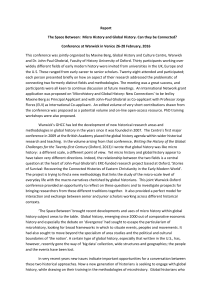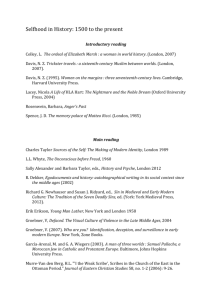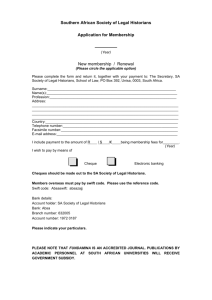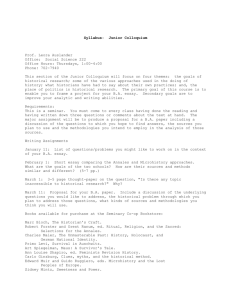‘The Space Between: Connecting Microhistory and Global History’
advertisement
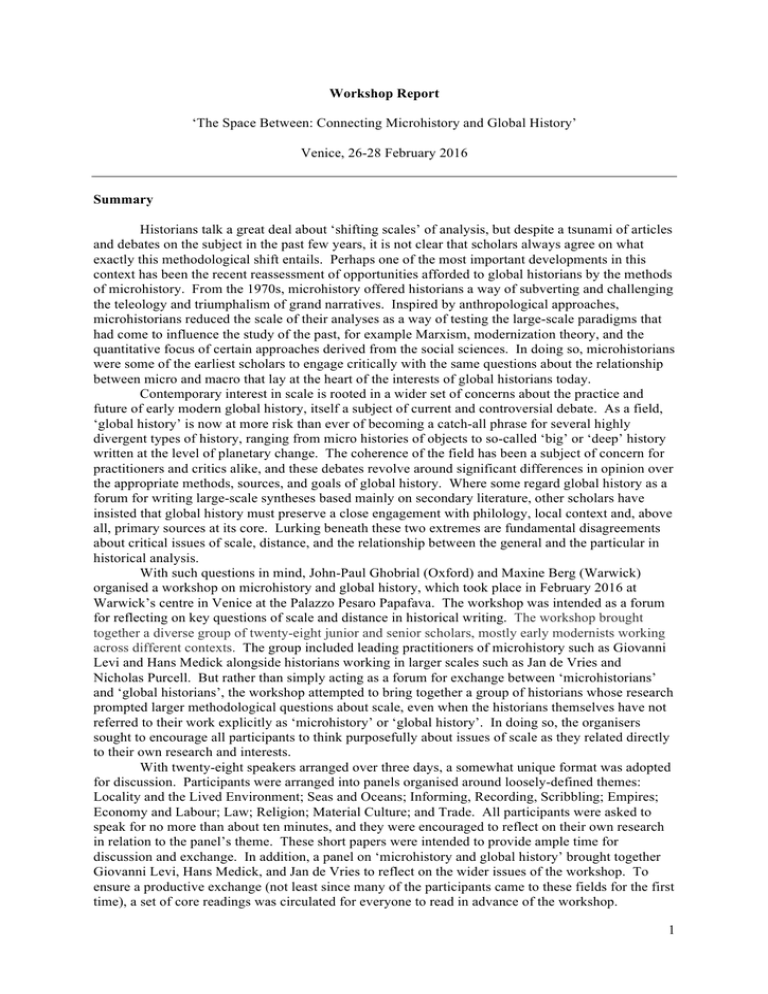
Workshop Report ‘The Space Between: Connecting Microhistory and Global History’ Venice, 26-28 February 2016 Summary Historians talk a great deal about ‘shifting scales’ of analysis, but despite a tsunami of articles and debates on the subject in the past few years, it is not clear that scholars always agree on what exactly this methodological shift entails. Perhaps one of the most important developments in this context has been the recent reassessment of opportunities afforded to global historians by the methods of microhistory. From the 1970s, microhistory offered historians a way of subverting and challenging the teleology and triumphalism of grand narratives. Inspired by anthropological approaches, microhistorians reduced the scale of their analyses as a way of testing the large-scale paradigms that had come to influence the study of the past, for example Marxism, modernization theory, and the quantitative focus of certain approaches derived from the social sciences. In doing so, microhistorians were some of the earliest scholars to engage critically with the same questions about the relationship between micro and macro that lay at the heart of the interests of global historians today. Contemporary interest in scale is rooted in a wider set of concerns about the practice and future of early modern global history, itself a subject of current and controversial debate. As a field, ‘global history’ is now at more risk than ever of becoming a catch-all phrase for several highly divergent types of history, ranging from micro histories of objects to so-called ‘big’ or ‘deep’ history written at the level of planetary change. The coherence of the field has been a subject of concern for practitioners and critics alike, and these debates revolve around significant differences in opinion over the appropriate methods, sources, and goals of global history. Where some regard global history as a forum for writing large-scale syntheses based mainly on secondary literature, other scholars have insisted that global history must preserve a close engagement with philology, local context and, above all, primary sources at its core. Lurking beneath these two extremes are fundamental disagreements about critical issues of scale, distance, and the relationship between the general and the particular in historical analysis. With such questions in mind, John-Paul Ghobrial (Oxford) and Maxine Berg (Warwick) organised a workshop on microhistory and global history, which took place in February 2016 at Warwick’s centre in Venice at the Palazzo Pesaro Papafava. The workshop was intended as a forum for reflecting on key questions of scale and distance in historical writing. The workshop brought together a diverse group of twenty-eight junior and senior scholars, mostly early modernists working across different contexts. The group included leading practitioners of microhistory such as Giovanni Levi and Hans Medick alongside historians working in larger scales such as Jan de Vries and Nicholas Purcell. But rather than simply acting as a forum for exchange between ‘microhistorians’ and ‘global historians’, the workshop attempted to bring together a group of historians whose research prompted larger methodological questions about scale, even when the historians themselves have not referred to their work explicitly as ‘microhistory’ or ‘global history’. In doing so, the organisers sought to encourage all participants to think purposefully about issues of scale as they related directly to their own research and interests. With twenty-eight speakers arranged over three days, a somewhat unique format was adopted for discussion. Participants were arranged into panels organised around loosely-defined themes: Locality and the Lived Environment; Seas and Oceans; Informing, Recording, Scribbling; Empires; Economy and Labour; Law; Religion; Material Culture; and Trade. All participants were asked to speak for no more than about ten minutes, and they were encouraged to reflect on their own research in relation to the panel’s theme. These short papers were intended to provide ample time for discussion and exchange. In addition, a panel on ‘microhistory and global history’ brought together Giovanni Levi, Hans Medick, and Jan de Vries to reflect on the wider issues of the workshop. To ensure a productive exchange (not least since many of the participants came to these fields for the first time), a set of core readings was circulated for everyone to read in advance of the workshop. 1 Participants The following individuals participated in the workshop: James Amelang (Universidad Autónoma de Madrid), Sebouh Aslanian (UCLA), James Baldwin (Warwick), Maxine Berg (Warwick), Romain Bertrand (Sciences Po), Zoltán Biedermann (UCL), Guillaume Calafat (Paris I), Adrianna Catena (Oxford), Christian de Vito (Leicester), Filippo de Vivo (Birkbeck), Sarah Easterby-Smith (St Andrews), Jan De Vries (Berkeley), Jeroen Duindam (Leiden), Jorge Flores (EUI), Anne Gerritsen (Warwick), John-Paul Ghobrial (Oxford), Jos Gommans (Leiden), Pat Hudson (Cardiff), Mary Laven (Cambridge), Giovanni Levi (Venice), Hans Medick (Freie Universität Berlin), Julia McClure (Warwick), Luca Molá (EUI), Nicholas Purcell (Oxford), Giorgio Riello (Warwick), Carla Roth (Oxford), Jason Scott-Warren (Cambridge), Amanda Wunder (Lehman College and the Graduate Center, CUNY); Jacques Revel (EHESS) and Lucy Riall (EUI) were unable to attend due to illness. Themes and Discussions It is impossible to do justice here to the wide variety of directions in which discussions travelled over the course of an extremely productive three-day workshop. Although the participants all managed to find their own ways of engaging with the theme of the workshop, it would be neither desirable nor reasonable to suggest that any sort of agreement or consensus reigned in the end. Even so, it is worth drawing attention here to at least some of the important themes that emerged in the workshop discussions. • One major point of discussion concerned the way in which scholarship has tended to map terms like ‘micro’ and ‘macro’ on to the categories of ‘local’ and ‘global’. Some participants were especially keen to disentangle ‘micro’ from ‘local’ and ‘macro’ from ‘global’; others made persuasive cases for ways in which scholars could define the ‘local’ according to the language, terms, and experiences of the actual people they studied. This was especially salient, for example, in discussions of urban history, the mapping of space, and ideas about the construction of ‘lived environment’. • Where the methods of microhistory are aimed at engaging with a ‘general problem’, several participants wondered what was the ‘general problem’ that animated the field of global history? For some, the attempt to link microhistory and global history seemed nonsensical: microhistory being seen as a method and global history seen as more of a theme or field. Still others made forceful comments questioning why, for example, microhistorians should even care about linking themselves to developments in global history, and vice versa? • Alongside microhistory and global history, some participants emphasised the importance of other approaches such as comparative history, which had the benefit of engaging with general historical problems while resisting the problems associated with national history. Some participants noted that comparative history engaged productively with the same source issues that concerned microhistorians, not least in the potential of comparative history to engage with wide traditions of sources that shared a certain ‘family resemblance’. • Agency was a recurring subject of discussion. Some participants insisted that a microhistorical method enabled the global historian to focus on issues of agency and to reintroduce humans into the sometimes cosmic narratives of global history. Others warned against investing too much importance in ideas of agency that were specific to certain (modern Western) traditions and, more importantly, that sometimes obscured other, more powerful forms of coercion. • The question of global history’s relationship to sources was an ongoing theme in our discussions. While some participants were keen to emphasise that ‘global historians work in 2 archives’, others wondered whether the absence of deeper philological approaches to texts in global history was the real problem. • In the language of global history, several participants sought to add flesh to terms like connectivity, circulation, mobility, encounters, and intercommunication. In doing so, they emphasised the flexibility and variability of scale and distance, and the ways in which such phenomena are themselves constructed by historians. • Some participants reflected on the limits of microhistory, not least for scholars working in particular fields or with particular types of sources. A recurring point of discussion revolved around the challenges of writing a microhistory about sources that seemed to lack any sense of subjectivity. • Some participants sought to complicate the traditional genealogy of microhistory, emphasising the contributions of German, French and English historians alongside the pioneering Italian scholars of microstoria. • There were some especially trenchant critiques made of both microhistory and global history. Some participants worried that microhistory trivialized the most important forces of history, while exaggerating the importance of agency in historical change. Others questioned the foundations of ‘global history’ itself, rejecting a field that appeared to celebrate and justify globalization without questioning it and engaging with it more critically. • Some discussion was had about other fields in which issues of scale had long been paramount but which tended to be neglected by historians, for example geography. Some participants expressed the importance of linking the discussions of the workshops to other fields such as area studies, literature, and economics. It was thought by some that such discussions would benefit in the future from a wider spectrum of scholars, both scholars from other disciplines but also from a wider set of countries outside of Europe. Funding The workshop was made possible by generous support from the Fritz Thyssen Stiftung, the Global History and Culture Centre at Warwick, and ‘Stories of Survival: Recovering the Connected Histories of Eastern Christianity in the Early Modern World’, an ERC-funded project based in the Faculty of History at Oxford. The organisers are grateful to these institutions as well as to all the participants for making the workshop such a successful and thought-provoking experience. It is hoped that a publication will be produced, which will provide a fuller and richer account of the workshop and its discussions. Maxine Berg, University of Warwick maxine.berg@warwick.ac.uk John-Paul Ghobrial, University of Oxford john-paul.ghobrial@history.ox.ac.uk 3
